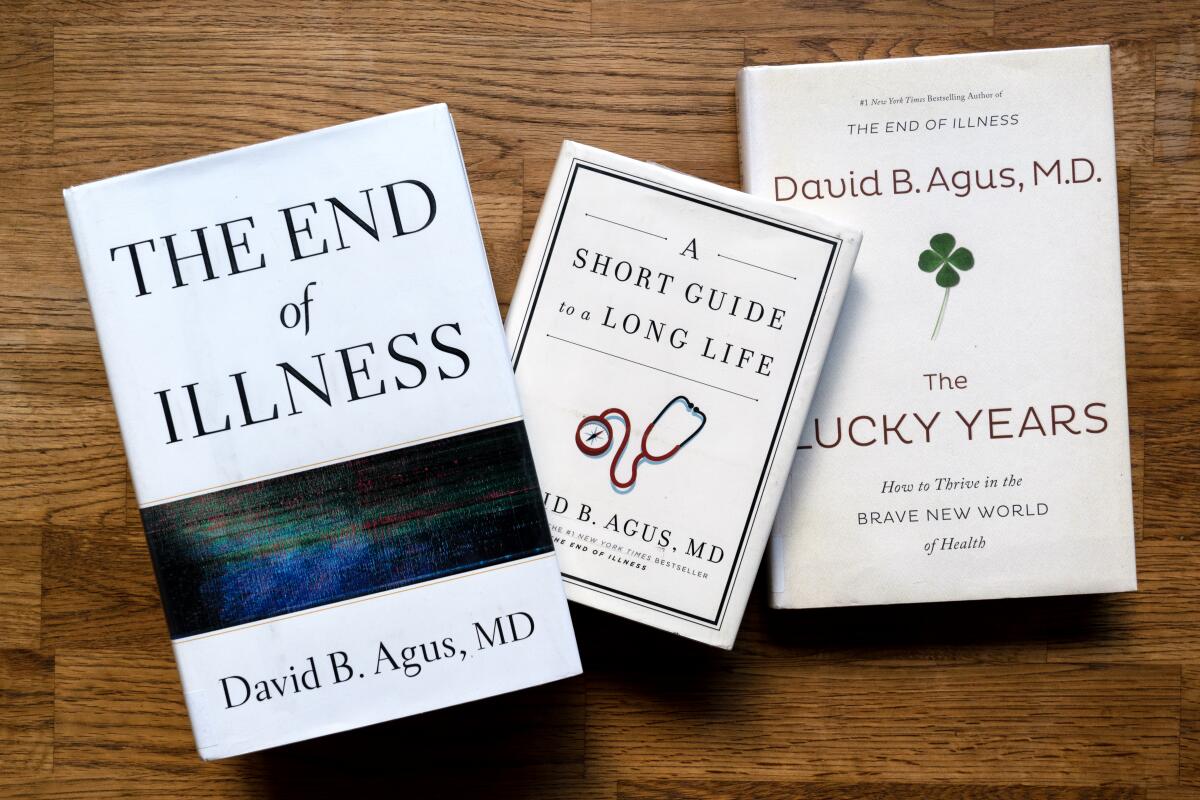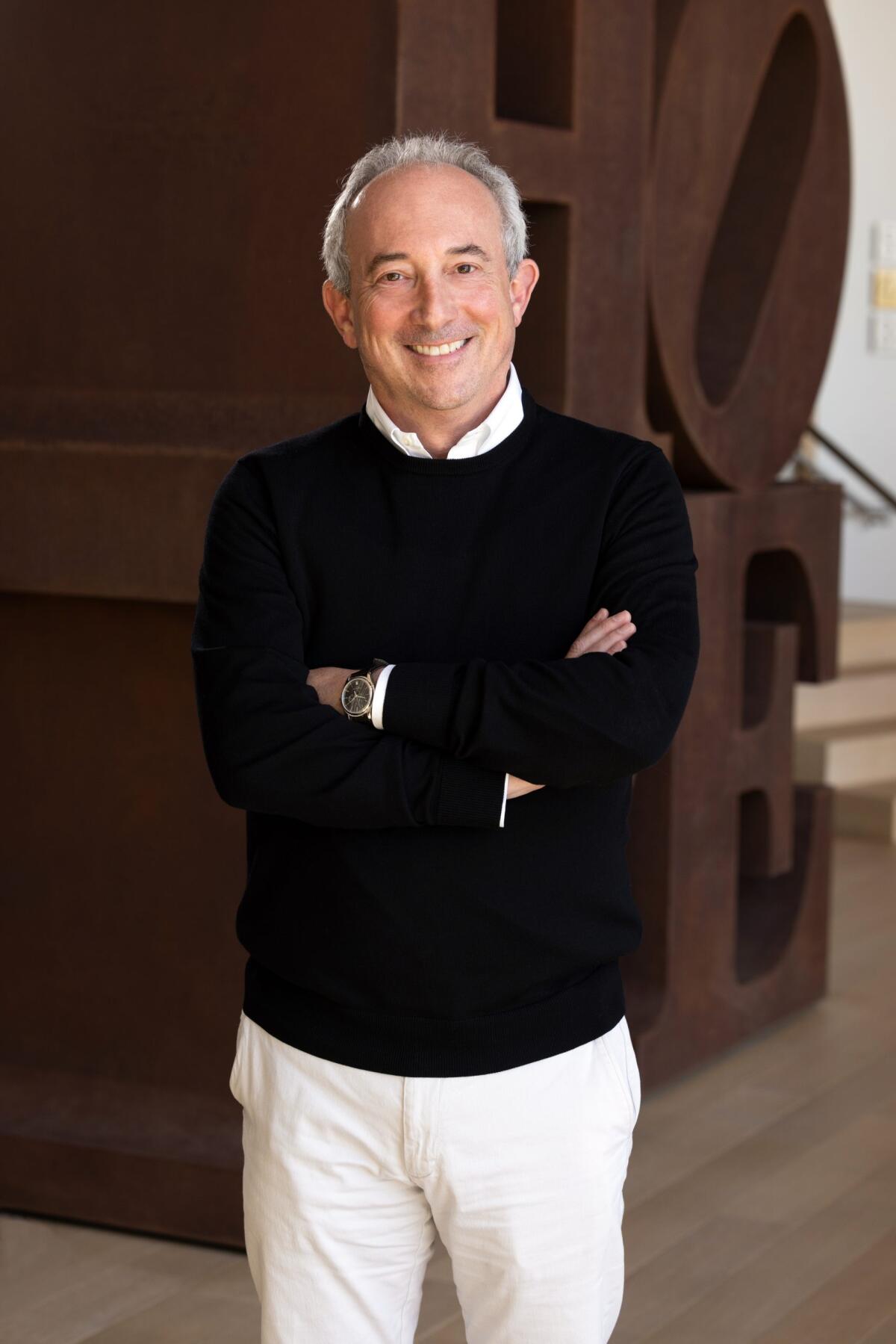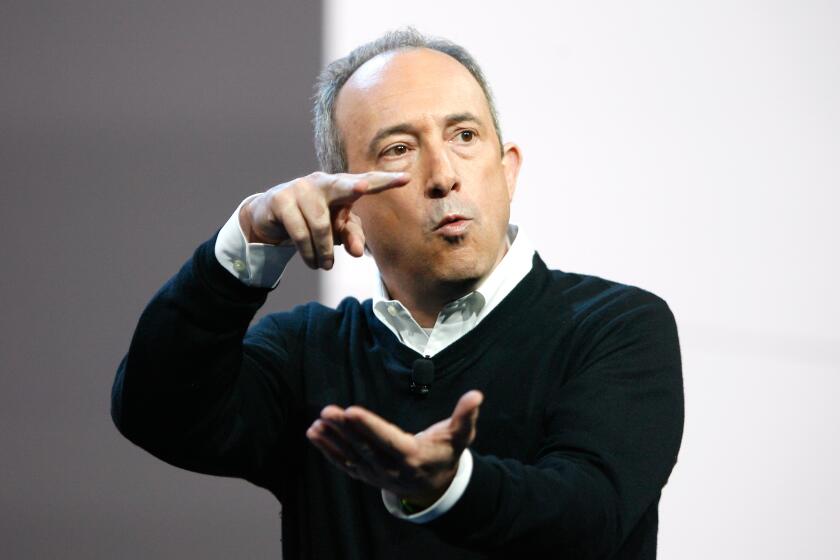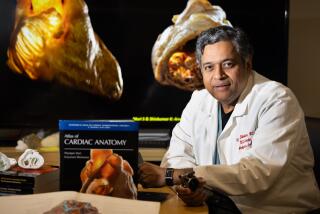Examination of USC doctor’s earlier books finds more troubling instances of plagiarism

With just days to go before the publication of his already-bestselling title, “The Book of Animal Secrets,” Dr. David Agus said he was surprised to learn that at least 95 passages appeared to be copied from other uncredited sources, sometimes word for word.
Sales of the book were suspended, and Agus pledged to rewrite it before it was released.
“I take any claims of plagiarism seriously,” the USC oncologist and media personality said in a statement last week after a Times investigation identified the parallel texts.
The Times has since reviewed Agus’ three previous books — “The End of Illness,” “A Short Guide to a Long Life” and “The Lucky Years” — and found more than 120 passages that are virtually identical to the language and structure of previously published material, including newspaper and magazine stories, scientific journal articles, popular science books, Wikipedia and blogs.
Some of the matching passages go on for multiple pages. Scores of paragraphs are near-exact copies of other people’s work. Few of those original authors are credited in Agus’ books, which were published by Simon & Schuster.
The Times presented the company with a list of the passages this week. The publisher responded two days later with a statement saying it was aware of “these issues” but that the books would stay on the market in their current form until new editions are released.
All four of Agus’ books were produced in collaboration with Los Angeles writer Kristin Loberg. She acknowledged the “allegations of plagiarism” and said Agus was not to blame.
“I accept complete responsibility for any errors my work may have contained,” Loberg said in a statement to The Times. “I apologize from the bottom of my heart to the authors, publishers, creators of works that were not appropriately credited, and those interested in the important public health issues addressed by these books.”
In his own statement, Agus also laid the blame at Loberg’s feet.
“I am grateful that my collaborator has confirmed that I did not contribute to, nor was I aware of, any of the plagiarized or non-attributed passages in my books,” he said. “This has been a painful but valuable learning experience for me and I want to reiterate my deepest regrets for my own lack of rigor in supervising my collaborator in our process of finalizing the manuscripts.”
A forthcoming book by Dr. David Agus is rife with instances of plagiarism. After being contacted by The Times, Agus and Simon & Schuster have halted publication.
When asked, neither Agus nor Loberg would explain their research and writing processes, or how so much misappropriated material made it into the books, apparently without Agus’ knowledge.
“I followed standard protocols and my attorney and I received several verbal and written assurances from this highly respected individual that she had run the book through multiple software checks to ensure proper attributions,” Agus said.
Loberg did not respond to requests to elaborate on the writing process.
The “Books” section of Agus’ website displays the covers of his four books, each featuring his name in large block letters and a picture of him in his signature white collared shirt and black sweater. Loberg’s name appears with Agus’ on the title pages, as well as in the books’ acknowledgments.
Click on one of the titles, scroll past the summaries and blurbs of praise from famous friends including Howard Stern, Al Gore and Lance Armstrong, and appended to the bottom is a new list of “additional notes” containing links to material that is “quoted,” “adapted” or “adopted” in his text.
New editions will be released “as soon as possible,” a Simon & Schuster spokesperson said, though no dates were available.
Loberg is credited as the co-author or collaborator on at least 45 books currently on the market, most published in the last 15 years. Thirteen of those titles are published by Simon & Schuster or its subsidiary imprints, and the company said it would review them “and where appropriate take action.”
Three of those books are by Dr. Sanjay Gupta, CNN’s chief medical correspondent: “World War C,” “Keep Sharp” and “12 Weeks to a Sharper You.”
In a statement, Gupta said: “Upon learning from the LA Times article of instances of plagiarism involving my collaborator, I immediately began to personally review my own books for any instances of plagiarism, inadequate attribution or other areas of concern. When the review is complete, I will ask my publisher to reissue the books with the corrections.”
He added: “While acknowledging Ms. Loberg’s statement accepting full responsibility, I apologize for my own role in these events and am saddened by the whole situation.”
All of the so-called “Big Five” publishing houses in the United States sell books that Loberg worked on, most of them related to health, diet or wellness. Hachette Book Group sells nine, including five co-authored with David Perlmutter, a celebrity doctor and frequent talk show guest in the 2010s.
His best-known book with Loberg, 2013’s “Grain Brain: The Surprising Truth About Wheat, Carbs, and Sugar — Your Brain’s Silent Killers,” has sold over 1 million copies worldwide, according to publisher Little, Brown Spark, a Hachette imprint. Perlmutter did not respond to requests for comment.
In a statement, Hachette said the company had no projects planned with Loberg. It would not comment on whether it would examine its existing titles for plagiarism.
Penguin Random House, which sells 15 Loberg titles, and HarperCollins, which sells four, said they had begun reviewing the books she worked on.
As for Agus’ books, plagiarism experts told The Times that Loberg’s admission does not absolve the doctor.
“If your name is on the cover, you take full responsibility for what is on the inside,” said Debora Weber-Wulff, a professor of media and computer science at HTW Berlin’s University of Applied Sciences in Germany who specializes in detecting plagiarism.
If your name is on the cover, you take full responsibility for what is on the inside.
— Plagiarism expert Debora Weber-Wulff
The Times shared passages from Agus’ books with Weber-Wulff and two other experts. All three said that the material they reviewed met the definition of plagiarism.
“If a student submitted academic work like this, it may be considered unduly derivative or referred for an investigation into academic misconduct,” said Thomas Lancaster, a computer scientist at Imperial College London who researches academic integrity and plagiarism.
Jonathan Bailey, owner of the copyright and plagiarism consultancy CopyByte in New Orleans, also said that Loberg’s willingness to take the blame does not eliminate her collaborators’ responsibility for books they claimed to write with her help.
“The person who puts their name on the book ultimately has full responsibility for what is inside it,” Bailey said. “They are the ones taking credit for the book and, as such, they also receive the blame.”
The multiple instances of misappropriated material in Agus’ books will make for more work than simply adding footnotes and “according to” credits.
Simon & Schuster’s marketing copy describes Agus as a “pioneering cancer doctor” and his books as “international sensations.” His first three titles have sold more than 370,000 copies in various formats, according to NPD BookScan.
Yet some of what those books present as the original insights of a celebrated clinician-researcher are the words of other scientists.

Page 170 of Agus’ 2012 book, “The End of Illness,” says of a 2007 study on vitamin use and prostate cancer: “The findings lend further credence to the possibility of harm associated with increased use of supplements, including increased rates of cancer and death from cardiovascular problems. The study adds to the growing evidence that questions the beneficial value of antioxidant vitamin pills in generally well-nourished populations and underscores the possibility that antioxidant supplements could have unintended, and even negative, consequences for our health.”
The passage closely mirrors one in an article about the same study that appeared in the Journal of the National Cancer Institute five years before Agus’ book was published.
“The findings lend further credence to the possibility of harm associated with increased use of supplements, including increased rates of cancer and cardiovascular mortality,” physician-researchers Goran Bjelakovic and Christian Gluud wrote.
The study’s findings “add to the growing evidence that questions the beneficial value of antioxidant vitamin pills in generally well-nourished populations and underscore the possibility that antioxidant supplements could have unintended consequences for our health,” they continued.
The passage is one of several from Bjelakovic and Gluud’s article that appears in virtually identical form in “The End of Illness.” Neither author nor their article are mentioned in the book or its bibliography.
On Page 62 of “The End of Illness,” Agus introduces a 2010 study on aspirin and cancer prevention that was published in the medical journal Lancet. The book goes on to repeat, nearly verbatim, the entirety of a 373-word article published by Gizmodo in 2010.
That article quoted Dr. Peter Rothwell, a neurologist and stroke researcher at the University of Oxford who led the aspirin study.
“Previous guidelines have rightly cautioned that in healthy middle-aged people, the small risk of bleeding on aspirin partly offsets the benefit from prevention of strokes and heart attacks,” Rothwell told Gizmodo. “But the reductions in deaths due to several common cancers will now alter this balance for many people.”
The Lancet study is listed in the bibliography of “The End of Illness,” but neither Rothwell nor the Gizmodo article is mentioned in the text. Instead, Rothwell’s words appear as Agus’ own assessment.
“Prior guidelines have rightly cautioned that in healthy middle-aged people, the small risk of bleeding on aspirin partly offsets the benefit from prevention of strokes and heart attacks,” Agus’ text reads. “But the reductions in deaths due to several common cancers may now shift this balance for millions.”
A 2015 article on precision medicine in the Journal of the American Medical Assn. quoted physicians whose observations turned up a year later in “The Lucky Years” as Agus’ own.
“Precision medicine implies that ‘if you know somebody’s genes, you’ll be able to fit the treatment to them, which is reductionist,’” Dr. Zackary Berger, an internist and epidemiologist at the Johns Hopkins School of Medicine, told an interviewer.
“Therein lies the main challenge of precision medicine: it implies that if you know your genome, you can fit treatments to it. But that’s a reductionist view,” reads Page 114 of “The Lucky Years.”
“We see 16,000 new patients a year. We want to turn them into a giant cohort study, like the Framingham Study,” Dr. Barrett Rollins of the Dana-Farber Cancer Institute is quoted as saying. “Breast cancer patients with a mutation in gene X: do they live longer? do they live shorter?”
“These large-scale studies,” Agus writes of the cancer center’s efforts, “should help us learn the answers to questions like: Do cancer patients with a variation in gene X live longer or shorter?”
Neither Berger nor Rollins is mentioned in Agus’ book. His use of their quotes — as well as a long paragraph on the cystic fibrosis drug Kalydeco that echoes a portion of the article — “fits the definition of plagiarism,” said Rollins, an oncologist who is also Dana-Farber’s research integrity officer.
From the looks of things, even a basic plagiarism check would have spotted these issues.
— Jonathan Bailey, owner of the copyright and plagiarism consultancy CopyByte
When it published 2014’s “A Short Guide to a Long Life,” Simon & Schuster claimed that Agus “turned his research into a practical and concise illustrated handbook for everyday living.” Yet some of the advice in the 208-page volume bears a striking resemblance to information originally published elsewhere.
Several sentences about nutrition on Page 28 appeared word for word on a blog called “Nurtured by Nature” in 2012. A passage on the importance of sleep on Page 145 closely parallels a paragraph in a 2010 study on sleep disorders.
And three continuous pages of personal healthcare tips appear to have been copied and pasted with only minimal changes from a 2013 list originally posted on the Testicular Cancer Awareness Research Education website.
“From the looks of things, even a basic plagiarism check would have spotted these issues,” Bailey said.
Before Agus’ close friend Larry Ellison tapped him in 2016 to be the founding director and chief executive of USC’s Lawrence J. Ellison Institute for Transformative Medicine in West Los Angeles, Agus was a prostate cancer specialist at Cedars-Sinai Medical Center and then at USC. His research has received millions of dollars in funding from the National Institutes of Health.
How tech mogul Larry Ellison’s friendship with a USC doctor led to $200-million cancer research gift
Oracle founder Larry Ellison never finished college, much less attended USC.
The Ellison Institute and USC formally separated in May 2021, the university said, though Agus remains on the USC faculty.
“The university takes allegations of plagiarism very seriously and has processes in place to review such matters,” USC’s Keck School of Medicine said in a statement. “We are unable to comment further at this time given the confidential nature of personnel matters.”
A representative of CBS News, for which Agus is a medical contributor, said no upcoming segments with him were planned at this time and that his “situation is under review” following the plagiarism allegations.
Ellison Institute President Lisa Flashner issued a statement of support for Agus, saying he brought the situation to his colleagues’ attention immediately.
“We appreciate and support his efforts to address the matter,” she said in a statement. “His leadership has allowed the Institute to do incredible work to the highest standards, and we continue to focus on working together to improve patient care and treatment.”









